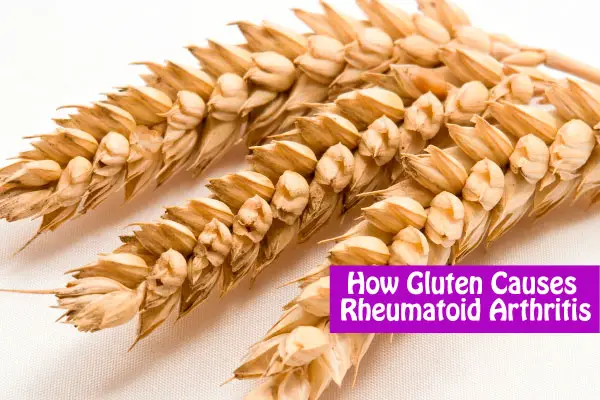Eating foods that contain gluten can lead to the development of Rheumatoid Arthritis (RA). Rheumatoid Arthritis is a disease that is characterized by pain and inflammation in the joints.
Intolerance to gluten can lead to the small intestine being damaged whenever gluten is present.
Gluten is a protein that can be found in most grains. Pasta, pretzels and bread are some of the common foods that contain gluten.
People who are intolerant to gluten may experience some side effects from ingesting gluten while others do not present any symptoms at all and could therefore be unwittingly increasing their risk of developing the serious condition known as Rheumatoid Arthritis.
Intolerance to Gluten
When you have an intolerance to gluten it means that your body has a difficult time getting the gluten properly digested. Gluten can be found in oats, rye, barley and wheat.
If it is not managed, an intolerance to gluten can lead to conditions that are serious such as diabetes and even certain types of intestinal cancer.
Beyond that, an intolerance to gluten can also cause aching joints which is symptomatic of Rheumatoid Arthritis.
Other gluten intolerance symptoms include but are not limited to things like muscle cramps, nausea, hair loss, abdominal pain, seizures, mouth ulcers and loss of appetite.
Rheumatoid Arthritis
Rheumatoid Arthritis is a disease that is a member of the autoimmune diseases. This means that it can cause the immune system in the body to attack healthy tissue instead of unhealthy.
The true cause of Rheumatoid Arthritis is unknown but it is found mostly in women of middle age although men are also able to contract this disease.
Symptoms of Rheumatoid Arthritis can include stiffness and pain in joints on either or both sides of the body.
More often than not, this occurs in the fingers, knees, wrists, ankles and feet. Affected joints may also feel warm or tender when they are inactive.
Over time, Rheumatoid Arthritis can lead to severe deformity of the joints that are affected.
Autoimmune Attack
In a healthy body, when bacteria enters it, the immune system recognizes it at once as a threat and launches an attack on the invader. This helps the body in preventing illness or infections.
Unfortunately, people who suffer from autoimmune disease such as Rheumatoid Arthritis the body senses it’s own tissue as invaders and attacks it.
The lining of the intestines is damaged in these attacks and when that happens, it is like breaching the walls of a fortress.
Large amounts of germs, bacteria and viruses pour through the holes just as invaders would pour through the breach in the walls of a fortress.
There is a name for this condition and the autoimmune response…leaky gut.
Leaky gut may actually contribute to a person developing Rheumatoid Arthritis as well as a number of the other autoimmune diseases.
When someone is intolerant to gluten, the body will attack the grains that contain it and this can lead to damage in the intestines which in turn allows the particles of gluten into the blood stream where it is carried all over the body and yes, to the joints.
When it finds the joints and sets up camp, the immune system attacks the camps in the joints and damage is sustained by the joints.

Dietary Therapy
Dietary therapy may assist in reducing the symptoms of Rheumatoid Arthritis by eliminating those foods that cause the autoimmune system to go on the attack.
This type of therapy may even be able to slow the progression of the disease if you are able to completely eliminate all of your trigger foods from your diet.
Additionally, dietary therapy is an incredibly useful tool is determining what your trigger foods are.
Therapy of this type begins by eliminating each and every known trigger food for arthritis from your diet.
This includes beef, eggs, oranges, wheat, peanuts, milk, soy and malt. Individual foods are then slowly reintroduced in order to see if the body reacts to it.
This type of therapy can be extremely useful because if you are able to eliminate the trigger foods then you may be able to slow the progression of the Rheumatoid Arthritis and delay being put on lifelong medications.
If you suffer from RA then you will be aware that this is a serious and very painful condition. There is no cure for it either. The best that we can do when we contract this disease is to treat the symptoms.
If we can eliminate even a bit of the pain or stave it off for just a bit longer by removing gluten from our diets, don’t you think it is worth a try?
Gluten issues and intolerance is only a minor factor. I would say maybe only 10% of the world has issues with this. I think that it comes down to the other chemicals often found in things like bread, pasta sauce, ect. one example being high fructose corn syrup. As for RA, it seems to be on the rise and I would like to think it is a mix of not being in the sun enough (D3 deficiency) and a bad diet that causes too much acid in the body.
I have observed that I get some form of discomfort sometimes after taking oranges, eggs, and milk, does this mean I might be intolerant to gluten? Though I would try out this therapy to try and be sure that this food actually triggers the discomfort.